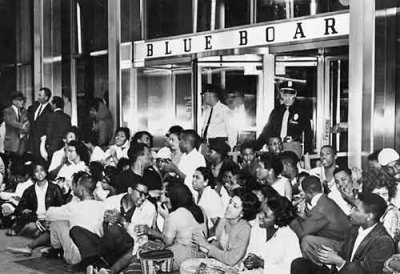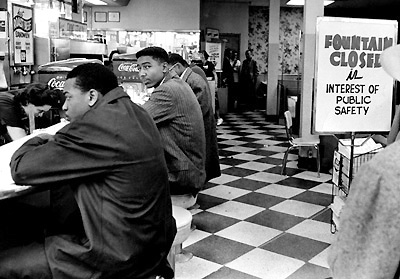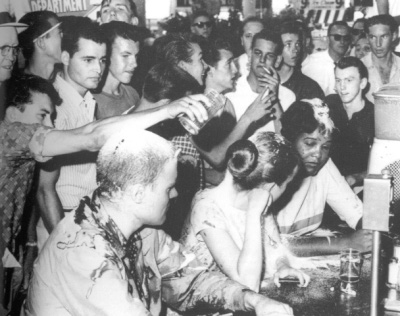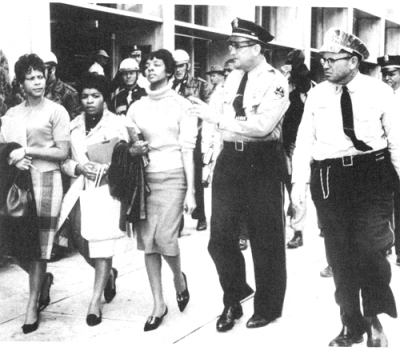Cops are here to protect you. (#8)
Government cops protect you by dragging a bunch of unarmed young Black men out of a train and lining them up against the wall — in response to an alleged fistfight — and then forcing one of them down to the ground and shooting him in the back. While he is lying prone on the ground, surrounded, and physically restrained both by the shooter and by a gang of other heavily-armed uniformed cops.
Then government cops protect you from being tainted
by knowledge of the incident
by rounding up everyone in the crowd that they can get their hands on and seizing the cellphones they had been using to take videos. You have only seen these videos because some dastardly criminals hopped back on the train before the cops could grab them, and then set out to taint us all with the truth.
The cop in the video is a Bay Area Rapid Transit cop named Johannes Mehserle. His victim, Oscar Grant, was either shot in the back when he was already handcuffed, or handcuffed by Officer Johannes Mehserle after he had been shot in back, depending on which witness accounts you listen to. I’m not sure which is worse. In any case, no-one has produced any reason whatsoever why Oscar Grant — who was unarmed, who was clearly showing his hands just before he was forced down and shot, who was forced down on his back, who was being searched and held down by two cops, with a third standing by and a gang of other cops standing around only a few feet away — could pose any credible physical threat to anybody at all, let alone the sort of physical threat that would justify standing up and drawing a gun on him.
We are told that (of course, of course) it’s a terrible tragedy
what happened, and we should feel in our hearts for all the people who suffered so much because of this incident,
but Officer Johannes Mehserle didn’t really mean to shoot Oscar Grant in the back. Maybe he pulled his gun and pointed it directly at a completely helpless victim who was clearly unarmed and under the complete physical control of the police, and then — oops — slipped and fired his gun into an unarmed man’s back by accident. Maybe he meant to pull out his taser so that he could torture a completely helpless man lying prone on the ground who clearly posed no physical threat to anybody with powerful electric shocks, but — oops — he just got so freaked out by The Situation that he couldn’t tell his hay-foot from his straw-foot and he accidentally whipped out his handgun instead, from a holster on the opposite side of his belt, even though it’s a completely different size and shape and weight, and then pulled the trigger and shot an unarmed man with a bullet instead. And, of course, none of this means a goddamned thing.
As I have said, and at the risk of controversy I will repeat: it doesn't matter if Mehserle meant to pull the trigger. He had already assumed the role of sole arbiter over the life or death of Oscar Grant. He had already decided that Grant, by virtue of his skin color and appearance, was worth less than other citizens. And rather than acquitting the officer, all of the psychological analyses and possible explanations of the shooting that have been trotted-out in the press, and all the discussion of the irrelevant elements of Grant's criminal history, have only proven this fundamental point.
If a young black or Latino male pulls a gun and someone winds up dead, intention is never the issue, and first-degree murder charges are on the agenda, as well as likely murder charges for anyone of the wrong color standing nearby. If we reverse the current situation, and the gun is in Oscar Grant's hand, then racist voices would be squealing for the death penalty regardless of intention. And yet when it's a cop pulling the trigger, all the media and public opinion resources are deployed to justify, understand, and empathize with this unconscionable act. One side is automatically condemned; the other automatically excused.
— George Ciccariello-Maher, CounterPunch (2009-01-09): Oakland’s Not For Burning?
Of course, there are two kinds of privileges: sometimes the problem is that a select class of people get consideration that everybody ought to be getting, but other people, not in the privileged class, are unjustly denied. And sometimes the problem is that a select class of people get special consideration that nobody ought to be getting, no matter their social class. Ciccariello-Maher doesn’t make it clear which kind he means, but in this case, the handwringing and We’ll never know
chanting and endless excuse-making in the effort to convert manslaughter or murder into nothing more than another Oops, our bad
is an example of the second kind. Given the observable facts of the case, there is nothing that could possibly have been going through Officer Johannes Mehserle’s head that could justify this execution-style shooting. If he went drawing his gun on an unarmed and prone and physically helpless man, who posed absolutely no credible threat to him or anyone else in the vicinity, and then, in the course of swinging his gun around, ended up firing it off, somehow, by accident, then he is guilty of criminally negligent homicide. If he planned to shock the hell out of someone who he had no reason to shock and ended up shooting him instead, by accident, then he is guilty of committing felony murder in the course of committing assault and battery. If he shot Oscar Grant intentionally, then, whatever may have been going on in his head about combs in Oscar Grant’s pocket or the folks in the crowd who were booing him from several feet away behind a line of other cops, or the hard, stressful life of a transit cop, then he is guilty of murder in the first.
And then we are told by self-righteous cops and their sado-fascist enablers that (of course, of course) it’s terrible what happened, and maybe Officer Johannes Mehserle overreacted, and zigged when he should have zagged, but really, we shouldn’t rush to judgment, and really, it’s not his fault, because, after all, there was a crowd of unarmed people several feet away, behind a line of other heavily-armed cops, yelling unkind words at him and making allegations as to the character of the police and watching what they were doing; maybe he became so confused and terrified by all this that, consummate professional though he may have been, he just lost all control of his rational faculties, and — oops — it just seemed like a good idea at the time to stand up and draw on an unarmed man being held down face-first on the ground in front of him. So it’s really the crowd’s fault:
We can wait for the official report on the shots fired but the earlier parts of those amatuer [sic] videos are also chilling for the hate-filled crowd reactions to what was, prior to the gunshot, a routine police encounter. We cannot long continue to police in a nation full of antagonists toward law and order. You can find it in videos all over the internet – crowds taunting, jeering, threatening, and obstructing police officers who are engaged in taming disorder.
Well, great. Then let government cops quit. Please. As if anybody ever asked them to go around policing
like that in this nation
. When government cops go around like this, protecting the hell out of us all, then they need to be taunted, jeered, threatened and obstructed until they stop.
It's not entirely clear yet what happened during the incident, and it may never be. [Oscar Grant] was apparently not one of the initial group dragged off the train–one of the videos shows him unrestrained and standing up, trying to intercede with the police. According to witnesses, he was trying to de-escalate the situation between the cops and his friends. This is not an isolated incident, not by a long shot. This kind of thing happens all the time: out-of-control police violence in response to non-violent communication. It happens to people of color, and to queer folks too. It happened to me and Jack a little more than a year ago, along with a group of colleagues and friends, for asking the police why they were making an arrest. An officer decided to pepper spray our group, without any real provocation. We're lucky, and privileged, that it wasn't a gun.
Who knows what's going through these cops' heads? Are they freaking out, paranoid, fearful, are they untrained, do they have no idea what to do? What really matters to me is that they've been given weapons to use, and they're wiling to use them at the slightest provocation, up to and including lethal force. What matters is that any questioning of their authority, whether you're holding a camera or trying to de-escalate a situation, is seen as a challenge that has to be put down, by taking your stuff away, or
crowd-controllingyou, or killing you. We should all be scared. Especially if you're part of a frequently-profiled community.. . .
I want to stress one more thing. The news is reporting that the police
felt outnumbered.This is exactly the same reason they gave for pepper-spraying the crowd that Jack and I were in. But let's be clear — it doesn't have anything to do with numbers. If it had been a quiet crowd ignoring the police and just sitting on the train, the numbers wouldn't matter. Theyfelt outnumberedbecause a lot of people watching were demanding to know what was going on, yelling, and refusing to justmind their own business.People who were demanding to know what was happening, because they know that abuses happen far too often and take far too many lives, and that someone has to watch the watchers.Unfortunately, to police this makes you
the enemy,especially if you're making your voice heard, yelling, demanding to know what's going on. The police, whether because of training or inculcated philosophy or temperament, see this as a potential riot, and they escalate the situation.
The plain fact is that what we have here is one of two things. Either we have a professionalized system of violent control which tacitly permits and encourages cops to handle any confusing or stressful situation with an attempt to dominate everyone in the vicinity by means of threats and overwhelming force, including attempts to retaliate or terrify people into submission by using violence — up to and including lethal violence — against powerless people under their physical control. Or else we have a system of government policing which has clearly demonstrated that it can do nothing effectual to prevent this from happening, over and over again. In either case, it is unfit to exist.




